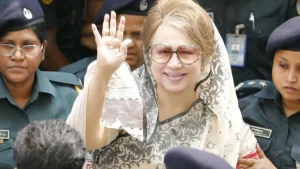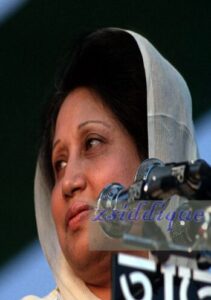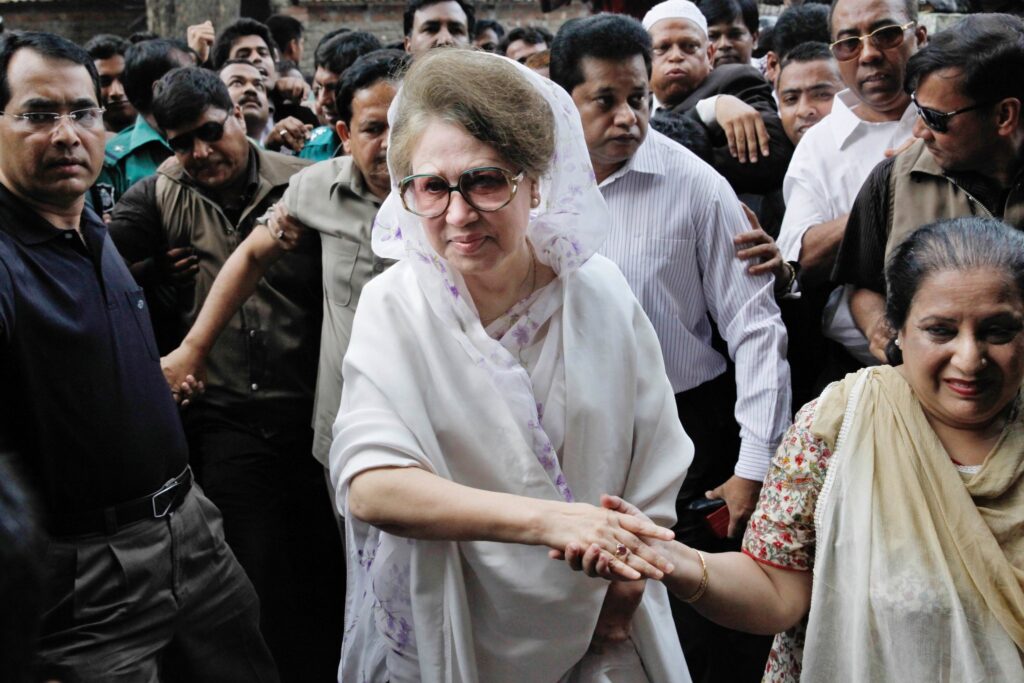The state of health of Begum Khaleda Zia is quite critical. Leaving subtlety for a moment, we can say she is at death’s door. In a recent press conference, the board of physicians and medical experts supervising her treatment provided a detailed picture of her medical condition. They emphasized that Bangladesh doesn’t have the facilities to treat her condition and she needs to be airlifted abroad to an advanced medical facility immediately. However, the Awami League regime is stonewalling the urgently required treatment by cycling through excuses of court orders and permissions.
Statements on Begum Zia’s medical treatment from the senior leaders and officeholders of the ruling party show that they are not rising above the mindset of political enmity. Their behavior and attitude have raised the question of whether the regime is willing to let appropriate medical care take place, let alone advanced care.
People in politics and the media are having conversations about Begum Zia’s treatment abroad almost every day. Sadly, a lot of these talks are mostly about legal perspectives on letting Begum Zia go abroad for treatment. Listening to and reading these conversations, one can almost get the Twilight Zone feeling of living in a country of rule of law. One can almost believe that in Bangladesh no court verdict is influenced by people in power, convicted murderers are not freed by presidential interventions, and people do not get special considerations in court for belonging to particular organizations. However, the reality of the country doesn’t allow us to entertain such fantasies even for a few moments.
It looks like the regime becomes a scrupulous follower of the rule of law only when the issue is the critical health of the opposition chairperson. Rules, that are in fact changed and crafted by the regime itself. Police, courts, and government administration, on the other hand, adopt quite broad latitudes when the ruling party and its supporters become the subject of law enforcement. The regime’s strict devotion to self-made rules and laws when the target of the laws is a nearly octogenarian, critically sick lady, lays bare the inhumanity that forms the core of the regime. Sadly, but not unexpectedly, most of the stalwarts of the civil society and the intelligentsia of the country also do not seem to be rising above wranglings of legal arguments when the matter is urgent medical treatment of Begum Zia. As usual, they are acting as the justifiers and whitewashers of the immoralities of the regime.
As a political leader who has a four-decade-long career at the highest level of national politics, in and out of power, Begum Zia can be criticized for many decisions made at various points. The controversial 15th February Election of 1996 took place while she was in power. She is also not the perfect of politicians. Critiques could argue that she was not as adept at connecting with the general people through carefully crafted artifices as her main opponent does regularly. She has never mastered the ability to weave self-serving narratives by manipulating the Bangladeshi people’s penchant for emotional outpourings. Because of that lack, opponents can still vigorously flag-wave events like the 15th February Election while they are guilty of far more serious crimes against democracy and the people.
In spite of all the criticism and propaganda leveled at her over the years by detractors relentlessly, Begum Zia has been the most popular politician in the country throughout her political career. Elections are the final word in gauging the popularity of politicians and in elections, Begum Zia has a unique and unapproached, let alone surpassed, record. Begum Zia contested the maximum number of parliamentary seats in every caretaker-held election from 1991 to 2008 and won all of them decisively. She won in constituencies all over the country. This supreme electoral feat indicates that she is indeed very popular and close to the heart of the common rural and urban folks throughout the nation.

This is an inexplicable puzzle to many of the urban civil society. They cannot explain this because they cannot model Begum Zia’s enduring appeal to the common people within their metropolitan mindset and conventional political frameworks. For example, they often sarcastically disparage Begum Zia’s educational qualifications and complete inexperience before being brought on to politics. However, their belittlement only highlights her extraordinary achievements. When Begum Zia took charge as the leader of the BNP in 1983, the party was still rudderless, confused, and fractious after the coup that displaced the party from power. From that low point, she led the party toward becoming a national party with deep roots all over the country in just a few years. A large section of civil society still cannot acknowledge this extraordinary feat.
When President Ziaur Rahman embarked on that ill-fated trip to Chittagong in late May 1981, his main agenda was getting under control the growing party disunity in the port city area. His tragic death left many of the party discords at the grassroots level unresolved or even worsened. Although President Zia founded the BNP, provided the party with ideology and inspiration, and brought together accomplished politicians and professionals from diverse backgrounds under an inclusive vision, the building of the party as a truly national organization was not finished. Begum Khaleda Zia is the homemaker and the neophyte politician, who took over a party that was largely formed top-down, at the hands of a military ruler, and turned it into the main political party of the democratic aspirations of the people of Bangladesh. She was the main opposition figurehead during President Ershad’s autocratic regime of the 1980s. When in 1986 Sheikh Hasina made a sudden about turn and took part in the arranged election, this ‘less-educated’ political leader made no compromises and remained steadfast to her promises. Her steady and lonely holding of the torch of democracy during those few years made a mockery of the sham election and sham parliament of General Ershad and hastened the regime’s demise.
The portion of the civil society that is active in women’s rights and feminist issues, usually talks about Begum Zia’s physical appearance instead of her significant achievements as a female politician advancing female issues. Mocking Begum Zia’s makeup, dress has been a staple for them since she became a national leader. Their shallowness and myopia about Begum Zia have made them oblivious to her human and leadership qualities.
An example would be illustrative here. On 25th May 1989, Begum Khaleda Zia went to Shibganj in the northwestern parts of the country to take part in the Long March against Farakka Barrage. From Shibganj official Rest house the destination, Kansat, is ten kilometers away. The plan was that Begum Zia would traverse the path on a vehicle while the people assembled for the movement would march on foot. However, when Begum Zia came out of the rest house in the morning, she announced that she would walk the whole way with the people. She walked ten kilometers with thousands of people in order to show the united and determined demand for a fair share of water for Bangladesh from the Farakka Barrage. The mental strength that enabled her to walk ten kilometers, and lead people’s movements for democracy in the streets, is seldom discussed in civil society. They almost never mention the fact that she pioneered female advancement in education by introducing special stipends for all female school students, a bold and visionary step in the early 1990s in a financially strapped country.

These examples of Begum Zia’s many outstanding achievements are not in public memory because the doyennes of civil society, who had a near monopoly in crafting popular national narratives, want only one political tradition to be positively affirming in popular memory, the Awami League and affiliated leftist traditions. They want everyone else to be consigned to the shadows at best and at worst portrayed as the darkness incarnate. Bangladesh Nationalist Party and Begum Khaleda Zia as the leader of BNP for four decades, comprise the core of this ‘other’ that must be confined to shadows. That’s why publicly saying anything positive about Begum Zia’s life and career is strictly verboten in our civil society. It’s not enough that the regime with its fully resourced propaganda machine is continuously vilifying her and the BNP. The intellectual class feels it is their duty to provide respectability to such partisan belittlement and vilification. A core ingredient of that propaganda effort is to deny the human personae of Begum Zia, which results in utter callousness about her life and health.
As Begum Zia is fighting for her life in a hospital bed, many people are worried about the future of BNP. Speculation is rife on the ways BNP will fragment into oblivion when she eventually meets her maker. For many years now, theories on BNP’s sure decline and fall have comprised a burgeoning field in Bangladeshi political analysis. However, few analysts have delved into the questions of, how, after hundreds of deaths, thousands of arrests and jailings, and hundreds of thousands of cases in the last fifteen years BNP remains vigorously strong at the grassroots nationwide? Why is the regime so terrified of a very sick octogenarian lady whose days of politics is surely in the past? Why the Awami League regime is still deathly afraid to let free and fair elections take place? Why are BNP leaders and workers winning at local elections despite the whole administration and law enforcement arraying against them? It seems narratives belittling Begum Zia’s accomplishments and prophesizing BNP’s demise are all made out of thin air.
The intellectuals and stalwarts of civil society would have served the country much better if they had put more thoughts on Bangladesh’s future rather than on BNP’s future. Then they would have understood the need for a centrist mainstream party like BNP in the political, social, and economic development of the country. They would have understood why vengeful denial of proper medical care to a towering statesman like Begum Zia would create a poisonous legacy. They would have understood that if BNP falls apart leaving a large vacuum in the political center, dangerous and destabilizing forces would occupy that space. Not only authoritarianism would be more entrenched, but extremism would also become mainstream.
BNP’s unimpeded politics and Begum Zia’s proper healthcare are both urgent at this time in Bangladesh. We have not seen any sign of that epiphany in the authoritarian regime. However, we are hoping for that enlightenment to dawn among them. We keep hoping that beyond politics, beyond appetite for power and domination, there are still kernels of humanity left among the people in the regime.

[A Bangla version of this article was previously published in Netro News Website https://netra.news/ ]


